Hou Hongqin: Working Hard to Ensure Qinqiang Opera Thrives
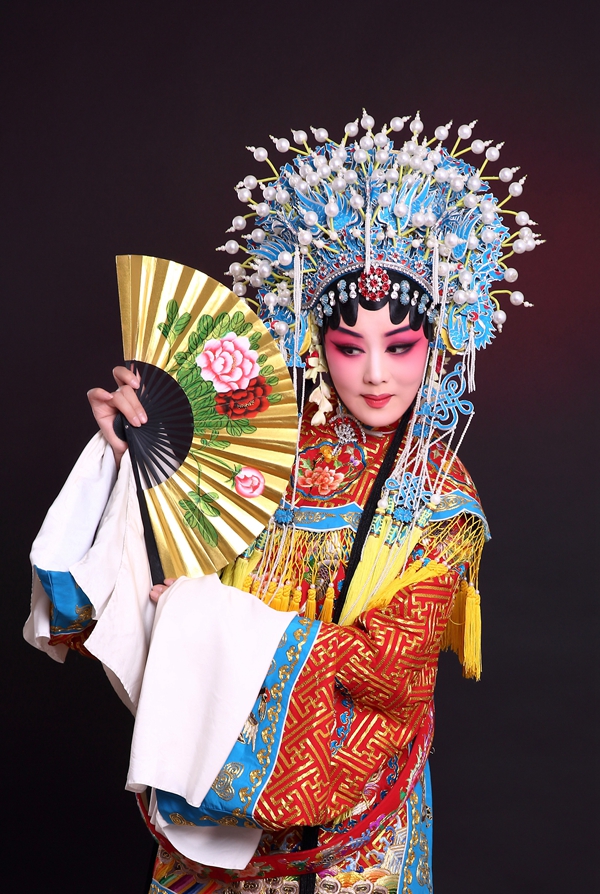
Hou Hongqin, a Qinqiang Opera (a traditional Chinese opera popular in Northwest China's Shaanxi Province) performer, has been involved in Qinqiang-related work for nearly four decades. She is head of Xi'an Sanyishe, a prestigious Qinqiang troupe. "I have devoted myself to Qinqiang, and I have achieved the most valuable thing in my life by engaging in the ancient art form," Hou says. In September, Hou was elected a delegate, from Shaanxi Province, to the 13th National Women's Congress of China. The Congress will be held later this year.
Hou plays dan (female characters) in Qinqiang performances. Given her excellent performing skills, she has received the Plum Performance Award, the highest accolade for traditional Chinese theatrical art, and the Shanghai Magnolia Stage Performance Award. She has also been named a National March 8th Red-Banner Holder. Hou has distinguished herself with her sweet voice and unique singing style. In addition to performing classical pieces, she has created several Qinqiang shows that have become popular with young viewers. The shows included The Past of Northern Shaanxi, Gu Yu and Yang Guifei.
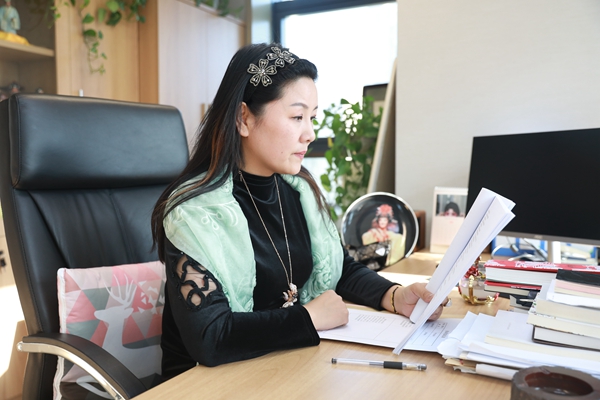
In the Blood
Hou was born in Zhouzhi, a county in Shaanxi Province known for maintaining its tradition of performing Qinqiang Opera.
With her father's support, Hou began learning to sing traditional folk operas when she was a child. She enrolled in Zhouzhi Opera School in 1984. One year later, she was admitted to Xi'an Art School. Given her deep love for Qinqiang Opera, she enjoyed studying and practicing the basic skills, even though it was challenging.
Singing is the most important skill used during an opera performance. Hou has inherited the traditional skill of singing Qinqiang Opera. Her singing is smooth and natural. In 1987, Hou, then a student, made her debut, during the Spring Festival xiqu (traditional Chinese operas) gala, in Shaanxi. Her eye-catching performance wowed the audience.
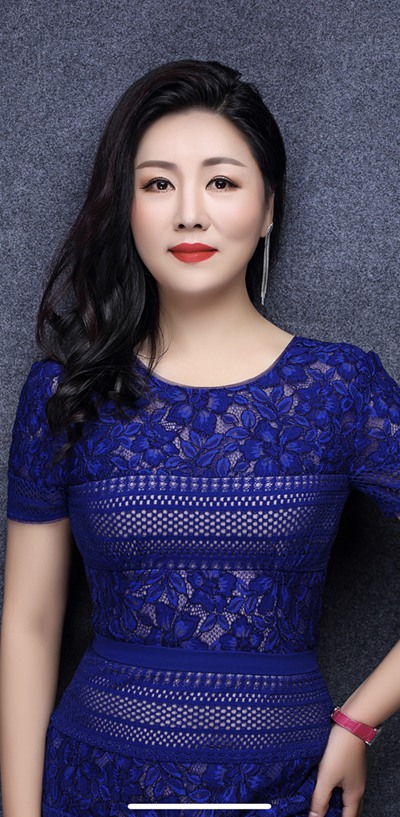
Hou often feels she is lucky in her art-related career. She is especially grateful that she was able to learn from Xiao Yuling, the late, renowned Qinqiang Opera performer. "Xiao taught me how to perform, and, more importantly, she taught me how to conduct myself well," Hou recalls.
In 1991, Hou was recruited by performance troupe Xi'an Sanyishe. While performing in several shows, including Famen Temple and Yu Tang Chun (The Story of Su San), with the troupe, Hou displayed good command of the basic skills, and she made some improvements in her acting skills during the performances.
In 1997, Hou performed the role of Huang Guiying, the leading role in a reproduced version of Huoyanju, a classical Qinqiang show. She followed the traditions of Qinqiang Opera performance, and her performance was so vivid the audience felt Huang was a real-life person.
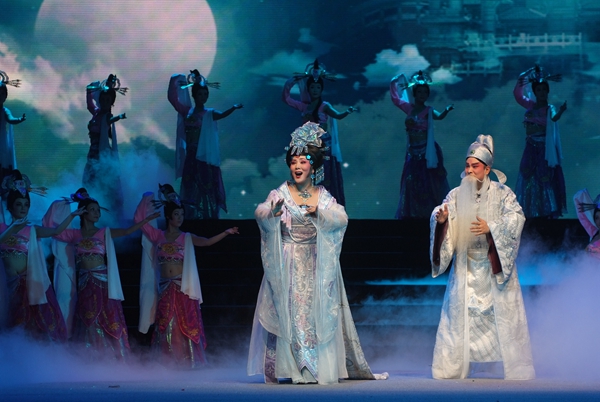
Since then, that version of Huoyanju has been performed in many venues in northwestern China, and it has been broadcast on the xiqu channel of China Central Television. In 2000, Hou, then-29, won the xiqu performers award during the 17th Plum Performance Award.
Some young Qinqiang Opera fans have produced and presented video clips of Hou's performances and special calendars (printed with her photos) to Hou. Hou says the audiences' passion for Qinqiang Opera inspires her to continue performing on stage.
"We have toured the country with our shows, and we have been invited to perform Qinqiang Opera abroad. When we display our costumes and musical instruments to overseas audiences, they show great interest. Sometimes, they even ask us to teach them to sing Qinqiang Opera, or to play the instruments," Hou says.
Only Hou knows how much effort she has expended to shine on the stage. One thing is certain, Qinqiang Opera is in her blood.
Innovation
Xi'an Sanyishe was established in 1895. Hou was appointed its head in 2005. "I was concentrating on performing Qinqiang Opera, and I paid little attention to what happened around me," Hou recalls. Thinking all of her achievements were connected with Qinqiang Opera, she decided to accept the challenge. "I will use all of my experiences to promote and develop Qinqiang Opera. Being a performer is not enough. Shaanxi is rich in cultural resources. Due to the diverse development of society, local operas in Shaanxi have suffered from the lack of inheritors. I will do my best to promote Qinqiang Opera, a national intangible cultural heritage, and to pass it down to next generations," Hou says.
Hou has a bed and a suitcase, in which she keeps clothing for different seasons, in her office. "If I am required to give an unscheduled performance, I can take the suitcase and leave right away. I want to perform as much as possible, so more people can watch Qinqiang Opera. On the other hand, I hope there will be more talented young performers on the stage," Hou says.
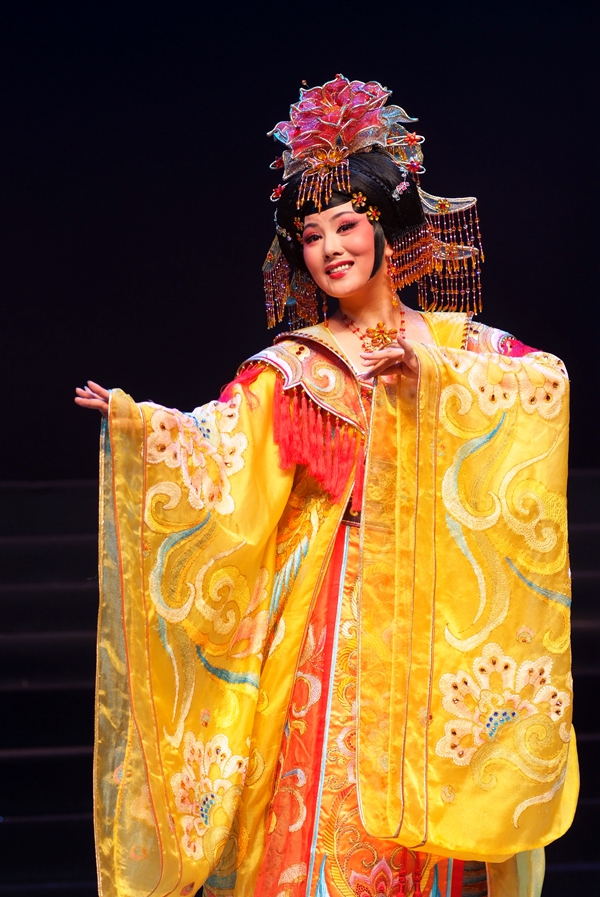
"Traditional culture and art are the roots and soul of our country. We should work hard to produce more high-quality Qinqiang operas. We should keep close ties with and serve the people," says Hou. Serving the people with good works is the principle she has adhered to throughout her decades-long artistic career.
In 2019, the reform of the cultural administrative system across the country brought new opportunities for Sanyishe's development. The troupe merged into Xi'an Performing Arts Group. Supported by the group, the troupe has produced several high-quality Qinqiang operas, based on both modern and traditional stories, including The Guardians, Shan Hua, and Sima Qian. The performances have earned the troupe more than 150 awards at the national (ministry) and provincial levels.
Shan Hua, a modern Qinqiang opera, was created by young scriptwriters, directors and composers of Sanyishe. The opera has been performed by the troupe's young actors. It tells the story about how Shan Hua, a village Party (Communist Party of China) secretary, led villagers in developing a fruit business, and in protecting the natural environment. It reflects the people's affection for land, and their pursuit of a better life during rural revitalization. The young actors' performance is refreshing, and allows viewers to feel the characters are close to them.
On May 19, 2023, Peng Liyuan, wife of Chinese President Xi Jinping, invited the first ladies of Kyrgyzstan and Uzbekistan to visit the historic Yisushe Theater, in Xi'an. The guests were Aigul Japarova, wife of Kyrgyz President Sadyr Japarov, and Ziroat Mirziyoyeva, wife of Uzbek President Shavkat Mirziyoyev. Japarov and Mirziyoyev were in Xi'an for the China-Central Asia Summit. At the Yisushe Theater, Peng and her guests watched a classical Qinqiang performance. Hou performed a role, and the performance was applauded by Peng and her guests.
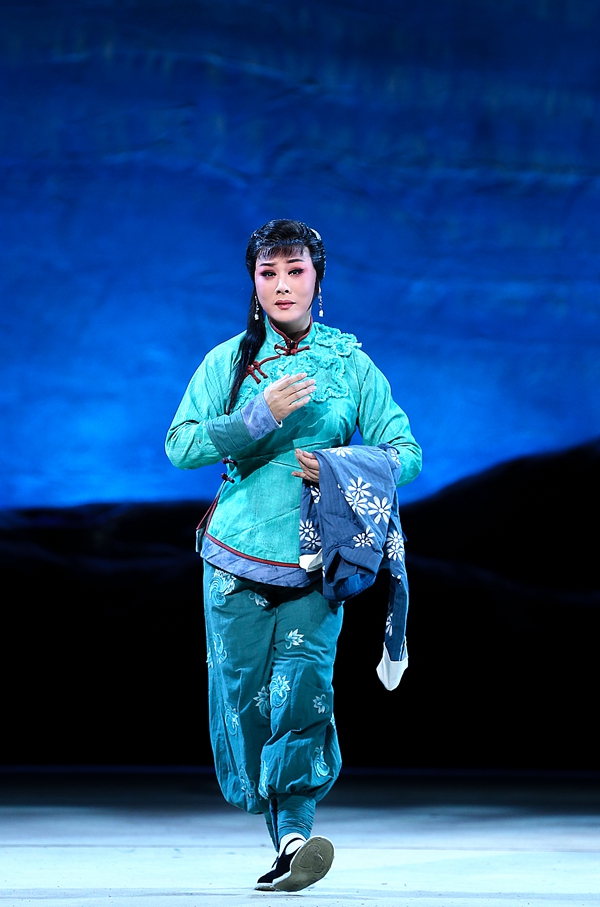
In recent years, Sanyishe has staged performances in many venues in Shaanxi, Gansu and Qinghai provinces, and in the Ningxia Hui and Xinjiang Uygur autonomous regions. Some 10 million viewers, combined, have watched the performances, either online or offline.
"Qinqiang is an ancient art form, and it is like a pearl formed by fine traditional Chinese culture. As a Qinqiang performer, I feel proud that I can be involved in the art that I love deeply. Preserving, inheriting and developing Qinqiang is the responsibility of each worker engaged in this art form.
"As our culture is rich in variety, and as the paces of people's lives have become faster, the influence of xiqu in the culture market has been challenged. To promote Qinqiang's development, I think the number of professional talents and the quality of works are the foundation. The coverage of performances is also important. Our troupe will adhere to the peoplecentered orientation, and we will strengthen cultivation of young talents. We will also keep exploring the market. We hope we will make our contributions to inheriting and developing traditional culture," Hou says.
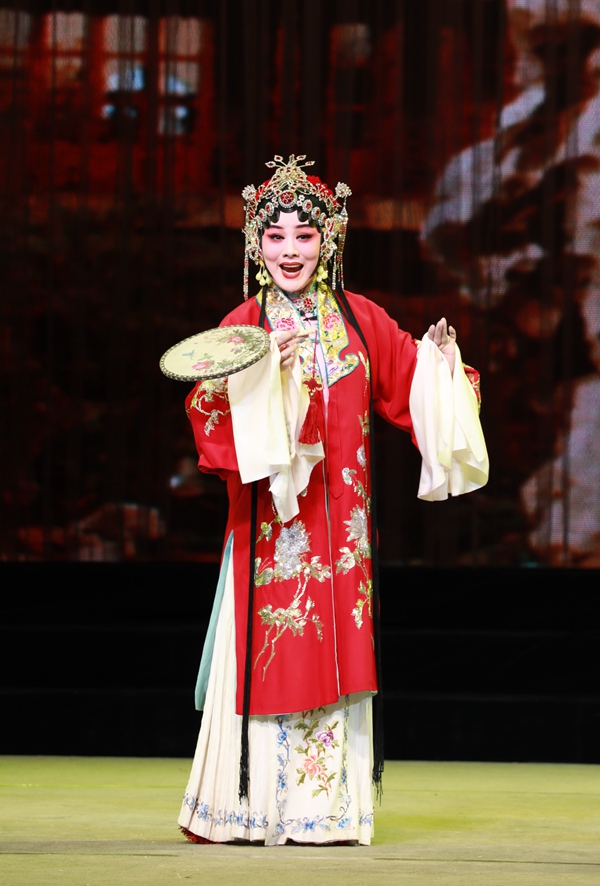
Cultivating Talents
Hou believes cultivation of talents is vital for a century-old troupe. She has spared no effort in creating opportunities for young actors. Among them, Zhang Tao and Yang Shengjuan, both actors of Sanyishe, have received the 27th and the 30th Plum Performance Award, respectively.
Several renowned artists of Sanyishe have passed down their skills to the younger generation of Qinqiang performers. They have taught young actors to sing, sentence by sentence, to make sure their singing is accurate. The young actors are encouraged to pursue their dreams, and to make outstanding achievements with a sense of self-esteem, self-reliance, self-confidence and self-improvement.
"The times have changed. Those who remain on traditional opera stages must have a deep affection for xiqu. Most xiqu actors begin learning at 11 or 12, and they have to endure many hardships to become professionals. It's hard for them to switch to other professions," says Hou.
"It is necessary to give young actors more care and opportunities, and to increase their incomes. In recent years, the leading roles of many of our troupe's major productions have been played by young actors."
During the second session of the 15th Xi'an municipal committee of the Chinese People's Political Consultative Conference, held in February this year, Hou, as a member of the committee, submitted a proposal aimed at strengthening the cultivation of traditional opera talents. The proposal indicated Sanyishe will cooperate with Shaanxi Normal University to establish an opera workshop this year. Hou hopes the workshop will help train more young artists who will have both moral integrity and professional competence.
Photos Supplied by Xi'an Sanyishe
(Women of China)
Please understand that womenofchina.cn,a non-profit, information-communication website, cannot reach every writer before using articles and images. For copyright issues, please contact us by emailing: website@womenofchina.cn. The articles published and opinions expressed on this website represent the opinions of writers and are not necessarily shared by womenofchina.cn.

 京公网安备 11010102004314号
京公网安备 11010102004314号